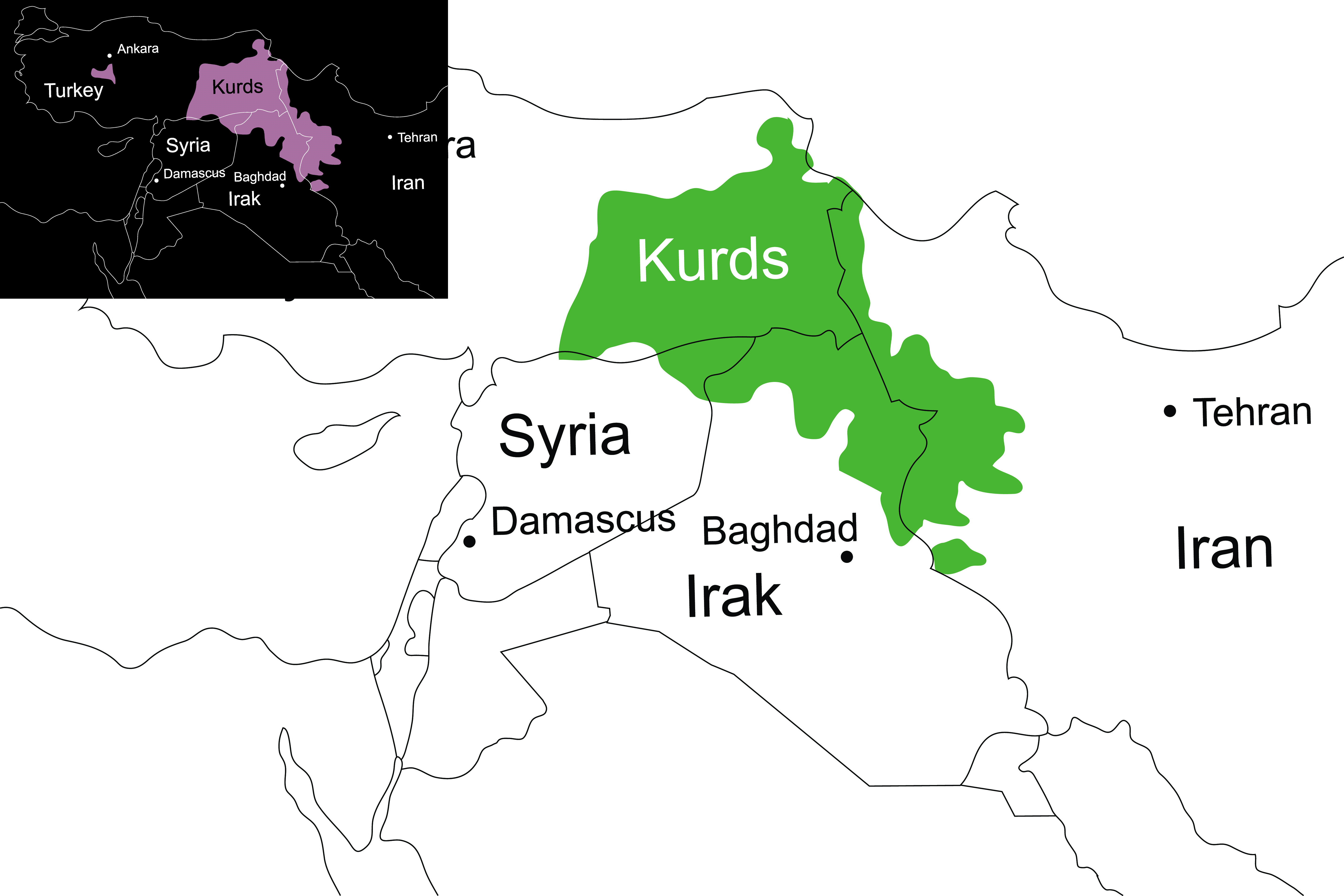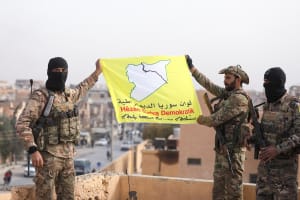Who are the Kurds and what is their relation to Syria?
Understanding the complex history of the Kurdish people and how it affects their future in the new Syria

The Kurdish people are a distinct ethnic group of Iranian origin, with a well-defined identity in the region they have inhabited for over 2,000 years.
The Kurds are mentioned in early Greek and Roman sources and have often been involved in the major political upheavals that shaped their region.
“No friends but the mountains”
The main area of Kurdish settlement, traditionally referred to as Kurdistan, spans areas of Iraq, Iran, Turkey, and Syria, and contains rugged hills and mountains throughout (the term Kurdistan goes back to the Seljuk Turkish period in the 11th century).
Throughout the troubled history of the Middle East, particularly in the area of upper Mesopotamia which encompasses part of Kurdistan, the Kurds have often been able to retreat into the mountains for sanctuary from invaders, or armies passing through. This constant use of the rugged hills and mountains for refuge has led to a common Kurdish expression, “No friends but the mountains.” This rugged terrain has helped the Kurds survive as a distinct ethnic group over millennia.
The Kurds have continued to remain a fairly distinct ethnic group for most of modern history, resisting the pressure to intermarry during various conquests. Even in the Islamic period, despite many Kurds adopting Islam as their religion, they have tended to maintain marriages within their ethnic group, which adds a strong element to their desire for autonomy and independence. This separateness and desire for autonomy have resulted in a history of conflict and repression by various conquering empires, from the Persians, to the Arabs, and the Turks.
In this regard, the Kurds are similar to the Jews, who despite their more than 2,000-year history of diaspora, have maintained a fairly robust ethnic and cultural identity. Also like the Jews, the tumultuous start of the 20th century, and the centuries of repression, produced a sharp response among the Kurds to the development of nationalism, one of the dominant political ideas of the 19th and 20th centuries.
The end of the Imperial Age, brought about by the realities of World War I and the negotiating of the Sykes-Picot agreement between Great Britain and France, divided the formerly Ottoman-dominated Middle East into separate regions and led the Kurds to hope that their dream for autonomy might be realized.

However, the Turkish Republic, which was formed after the defeat of the Ottoman Turks by the British and French, protested the terms of the Treaty of Sevres, signed after the defeat of the Ottomans, which contained a provision for a Kurdish state subject to a referendum. The Turkish leaders rightly understood that if a referendum were to take place, the Kurds would choose to form a separate, autonomous state of their own, diminishing Turkish territory.
Instead, the Middle East was divided up by European powers with little understanding of the different ethnic groups, and the religious and cultural distinctions within the territories. As a result, the region of Kurdistan was divided between the newly invented countries of Iraq, Turkey, and Syria, with the remaining territory being in Pahlavi-ruled Iran.
From the end of World War I until the first Persian Gulf War against Saddam Hussein and following his invasion of Kuwait, the Kurds in Kurdish settled areas, including Syria, were largely a rural people with little political influence or power. However, they continued to maintain their distinct identity based on culture and language.
The Kurds in Syria
In Syria, the Kurds primarily live in the northern and northeastern areas. Despite a brief period during the French Mandate of Lebanon and Syria, in which the Kurds received citizenship, the Kurdish population in Syria experienced a decline in status due to the rise of Arab nationalism. In the Syrian Republic before the beginning of the Assad Regime, the Kurds experienced a brief period of recognition, including the founding of a Kurdish political party. However, with the rise of pan-Arabism, the marginalization, discrimination, and political repression of the Kurds returned.
After the bloodless coup that installed the Assad family as the ruler of the country in 1970, the Kurds continued to experience repression. Under the Assad regime, they experienced bans on the use of the Kurdish language for education and business. The printing of books in Kurdish was also prohibited.
In 1962, a special census was carried out only in the northeastern province of Jazira, which stripped around 120,000 Kurds of their citizenship, rendering them stateless. This marked the beginning of decades of political exclusion and discrimination, which continued under the reign of Hafez al-Assad.
Like the Turkish government, the Assad regime had little tolerance for Kurdish dreams of autonomy. While the Kurdish Workers' Party (PKK), a Kurdish militant group based in Turkey, had some support in Syria, Assad did not tolerate any activity by the group aimed at establishing autonomy for Syrian Kurds.
The Syrian Civil War
The outbreak of the Syrian Civil War in 2011 brought a new chapter for the Syrian Kurds. Initially, many Kurds were cautious about joining rebel movements, wary of brutal suppression from the Assad regime and discrimination by jihadist groups active in the rebellion. However, as the war continued, Kurdish groups, notably the People's Defense Units (YPG) which later became part of today's Syrian Democratic Forces (SDF), began securing large portions of northern Syria, including areas with significant Kurdish populations.
This established areas of relative autonomy similar to the Kurdish autonomous zone in northern Iraq, as the Assad regime mostly focused on fighting the jihadist groups in the western part of the country.
Throughout the war, Assad’s government offered occasional negotiations, but it consistently opposed Kurdish calls for greater autonomy. In the later stages of the war, the Kurdish militias largely fought against Turkish-backed militias which had begun to take territory away from Syria’s northern border, and who focused on fighting what the Turkish government called Kurdish “terrorism.”
Assad was willing to leave the Kurds to fight the Turkish militias, while he concentrated on the jihadist groups, with support from both Russia and Iran. However, with the collapse of his regime, and the call by the de facto Syrian leader Ahmed al-Sharaa (also known as Abu Mohammed al-Jolani) to reunite the country, the future for the Kurds in Syria is not clear.

The post-Assad future
The history of repression, forced Arabization, and exclusion from political power, has left deep scars in the Kurdish community in Syria. The Kurds in the country were able to gain a welcome measure of political and military autonomy as a result of the Syrian Civil War. They will likely be very reticent to give up any of that willingly. The new regime's efforts to unite all of Syria, combined with hostility from its main financial and military backer – Turkey – means the Kurds in Syria continue to face a complex and dangerous political landscape.
While the Israeli government has expressed an interest in stronger ties with the Kurds, it is not clear what forms this relationship might take, and what level of support Israel could offer them without risking angering other elements, including the new Syrian regime.
The incoming administration of recently re-elected President Donald Trump has also not clearly laid out its foreign policy regarding the Kurds in Syria and Iraq.
As in the past, the Kurds may once again find themselves with "no friends but the mountains."

J. Micah Hancock is a current Master’s student at the Hebrew University, pursuing a degree in Jewish History. Previously, he studied Biblical studies and journalism in his B.A. in the United States. He joined All Israel News as a reporter in 2022, and currently lives near Jerusalem with his wife and children.
You might also like to read this:














